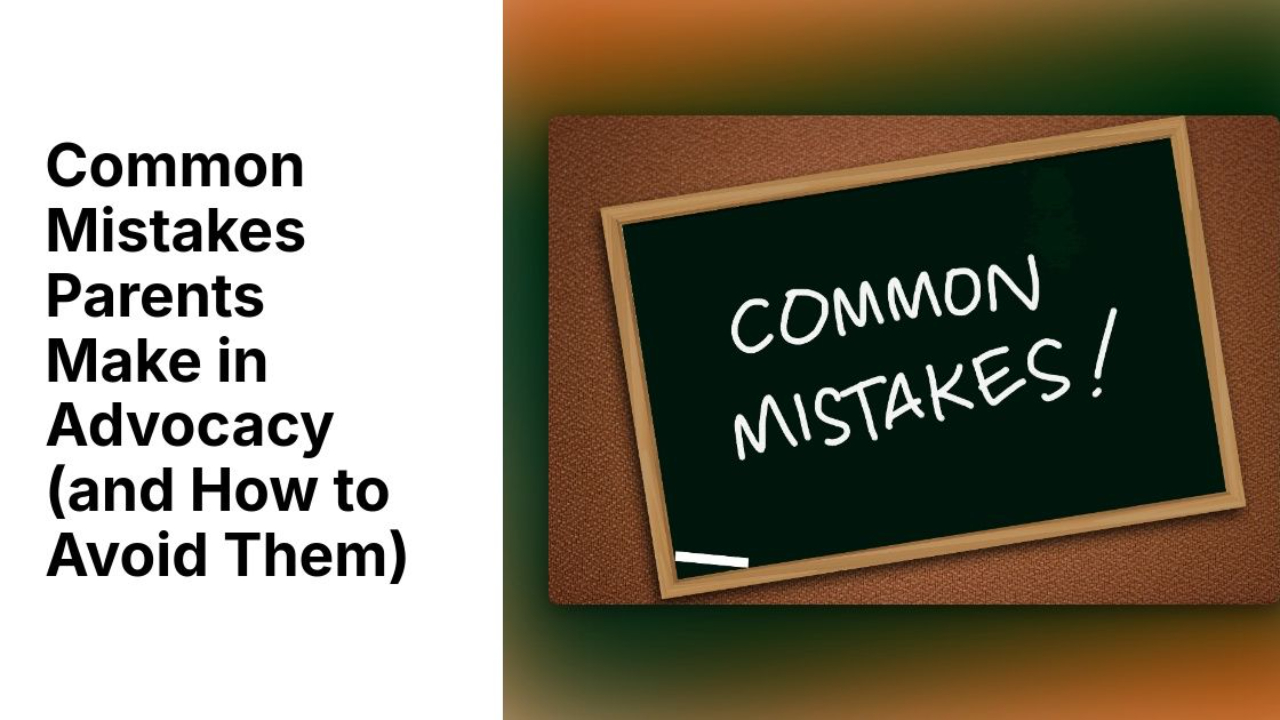Common Mistakes Parents Make in Advocacy (and How to Avoid Them)

When you’re a parent of a child with disabilities, becoming an advocate isn’t optional—it’s survival. You learn quickly how to speak up, push for services, and make sure your child is seen, heard, and supported.
But here’s something important: Advocacy is a skill, and like any skill, it takes time, practice, and self-compassion to build. Mistakes are part of the journey—and every single parent has made them (even the seasoned ones).
This guide is here not to judge, but to normalize the learning curve, celebrate your courage, and offer tips to help you advocate with more clarity, confidence, and connection.
Mistake #1: Doing It All Alone
The Pressure: "I’m the parent—I have to do everything."
The Pitfall: Burnout, isolation, and missed opportunities to build support.
What to Do Instead:
Remember, you are not meant to do this alone. Bring someone to meetings. Join a parent group. Talk to advocates or other families. Even just texting a friend before an IPP can help you feel less alone. And creating a Circle of Support around your loved one isn’t just good planning—it’s good self-care.
Mistake #2: Not Preparing for Meetings
The Pressure: “I’ll just go and see what they say.”
The Pitfall: Feeling overwhelmed, agreeing to things you don’t understand, or forgetting your questions.
What to Do Instead:
Prepare a short list of concerns, goals, and questions before any IPP meeting. Bring copies of important documents. Write down what you want for your child—and don’t be afraid to read from your notes.
You don’t need to know all the laws—you just need to speak from your experience.
Mistake #3: Letting Emotions Speak Louder Than the Message
The Pressure: "They’re not listening—I have to fight harder."
The Pitfall: Shutting down communication or damaging relationships with team members.
What to Do Instead:
Your passion is valid. Your child matters. But in advocacy, the how often shapes the what. Practice staying calm, clear, and focused—even when things get emotional. If needed, take a breath, ask for a break, or bring an advocate to help guide the conversation.
Being firm doesn’t mean being hostile. Being respectful doesn’t mean being silent.
Mistake #4: Accepting “No” as the Final Answer
The Pressure: "They said no, so I guess we’re out of options."
The Pitfall: Missing out on services your child has a right to receive.
What to Do Instead:
Ask why. Ask where that’s written. Ask who you can speak to next. You don’t have to be confrontational—just curious and persistent.
You can also put your request in writing. Sometimes, a simple email that says:
“I’m requesting [service] because I believe it’s necessary for my child’s goals. Can you please provide the reason for denial in writing?”
…can shift the conversation entirely.
Mistake #5: Ignoring the Person at the Center
The Pressure: “I know what’s best for my child.”
The Pitfall: Making decisions for your child instead of with them.
What to Do Instead:
Even young children or nonverbal individuals have ways of expressing preferences. When we include their voice—whether through words, pictures, gestures, or observation—we strengthen their confidence and sense of agency.
Ask:
-
What brings them joy?
-
What do they gravitate toward?
-
How can we center their choices more?
Person-Centered Planning starts with honoring their voice, not just our fears.
You’re Learning. You’re Growing. You’re Showing Up.
There is no perfect advocate. Every parent makes mistakes. What matters most is that you care deeply, you keep learning, and you keep showing up.
Advocacy is not about knowing all the right words—it’s about being clear on what matters, being willing to speak up, and being open to support.
And you don’t have to figure it all out alone.
Need support sharpening your advocacy skills or preparing for an upcoming meeting?
Let’s walk through it together. You can book a free consultation to feel more confident, prepared, and empowered in your role as your child’s strongest voice.
Book a Free Advocacy & Planning Call
If you’re curious about how we can help your loved one, let’s talk! In this free 30-minute call, we’ll:
💬 Talk about your loved one’s passions and strengths
💬 Explore possible ideas
💬 Identify first steps to turning a dream into reality

